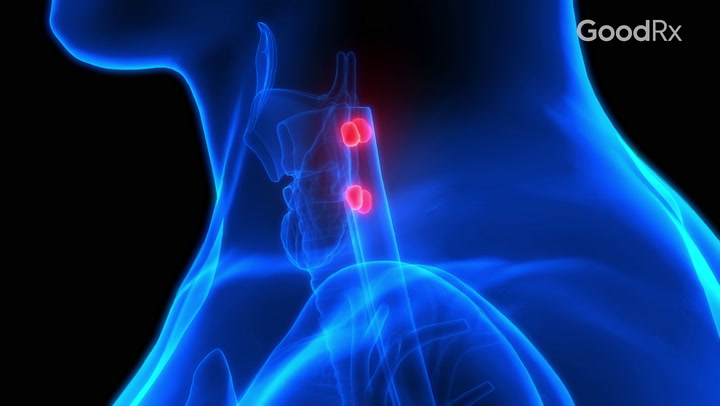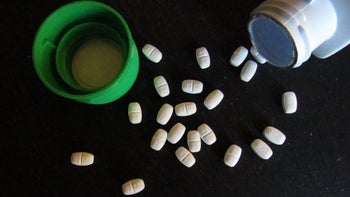
Appetite Stimulants: 9 Medications That Make You Want to Eat
Key takeaways:
Some medical conditions, including cancer, can cause unintentional weight loss. Megestrol and dronabinol (Marinol) are FDA-approved appetite stimulants that can promote weight gain and nutritional intake when needed.
Mirtazapine (Remeron) is an antidepressant that’s sometimes taken off-label to boost appetite. Cyproheptadine is a prescription antihistamine that’s also sometimes taken for this purpose.
There are ways to save on appetite stimulant medications, such as opting for lower-cost generics or looking for copay savings opportunities. A GoodRx coupon may help make your prescription medication more affordable.
Access savings on related medications
Table of contents

Certain health conditions — such as cancer and human immunodeficiency virus (HIV) — can take a toll on the appetite. Pain, trouble swallowing, and medication side effects can all make it challenging to eat if you have one of these conditions.
If you or a loved one are experiencing unwanted weight loss, you may be wondering about ways to get your appetite back. Medications aren’t the only option, but they can come in handy if the time comes.
Megestrol and dronabinol (Marinol) are a few examples of prescription appetite stimulants — also known as orexigenics. They work by increasing your appetite to help you eat more. But several products are available, so it’s good to keep your options in mind. Below, we discuss nine appetite stimulants in detail.
ED treatment on your terms
Build a personalized treatment plan and get erectile meds delivered discreetly. Subscriptions start at just $18/mo.

GoodRx is NOT insurance. Cancel anytime. GoodRx Health information and resources are reviewed by our editorial staff with medical and healthcare policy and pricing experience. See our editorial policy for more detail. We also provide access to services offered by GoodRx and our partners when we think these services might be useful to our visitors. We may receive compensation when a user decides to leverage these services, but making them available does not influence the medical content our editorial staff provides.
1. Megestrol
Megestrol is an FDA-approved medication that’s used to stimulate appetite and to manage cachexia (wasting away of muscle and fat) in adults with acquired immunodeficiency syndrome (AIDS). It comes as an oral liquid when used as an appetite enhancer.
A lab-made form of progesterone, it’s not completely known how megestrol stimulates appetite. But if your healthcare professional suggests it for you, the recommended dosage of megestrol depends on what formulation you’re taking, as shown in the chart below.
Formulation | Starting dosage |
|---|---|
625 mg (5 mL) by mouth per day | |
800 mg (20 mL) by mouth per day |
Megestrol is also sometimes taken off-label as an appetite stimulant for people with cancer. But there is mixed information about whether there is a meaningful benefit for people living with advanced cancer.
Megestrol isn’t the safest option for everyone, either. Pregnant women, for example, should avoid taking megestrol since it could harm the fetus. And megestrol can raise the risk of blood clots. You should call 911 or go to the nearest ER if you experience signs of a blood clot, such as sudden pain or swelling in your arm or leg, chest pain, or trouble breathing, while taking it.
2. Dronabinol
Dronabinol is another approved appetite stimulant for adults with AIDS. It’s taken 2 times a day, 1 hour before lunch and dinner.
Studies suggest dronabinol can increase body weight by up to 3 kg (7 lbs) in people who have HIV or AIDS. A lab-made version of delta-9-tetrahydrocannabinol (THC), it’s also used to treat nausea and vomiting from chemotherapy.
Like any medication, dronabinol can cause side effects. Stomach pain, dizziness, and paranoia are a few examples. It’s also a controlled substance because it has a potential to cause dependence and misuse.
Weight gain tips: Learn from experts about the best high-calorie drinks that help promote weight gain.
Antihistamines and weight gain: Pharmacists review how antihistamines, such as cyproheptadine, can potentially cause weight gain.
Prednisone stories: From weight gain to osteoporosis, learn from real people about their experiences with prednisone.
3. Oxandrolone
Oxandrolone is an anabolic steroid that acts like an appetite stimulant. It was sometimes used to promote weight gain in adults and kids following weight loss from certain situations — including after surgery, from an infection, or from certain medications. Oxandrolone increased body weight by promoting muscle growth.
There are some serious oxandrolone side effects to be aware of, though. The medication carries a boxed warning — the FDA’s most serious warning — about the risk of liver injury, liver cancer, and increased lipid levels. And like dronabinol, oxandrolone is a controlled substance because of the risk of dependence and misuse.
Important: In late June 2023, the FDA withdrew its approval of oxandrolone. It's no longer available in the U.S. due to safety concerns. It’s still available in select countries throughout the world.
4. Antidepressants like mirtazapine
Mirtazapine (Remeron) is approved to treat depression in adults. Two of the most common side effects of this atypical antidepressant are increased appetite and weight gain.
While these side effects usually aren’t ideal, some people opt to take advantage of them by taking mirtazapine off-label as an appetite stimulant. The medication is even being studied in clinical trials as an appetite stimulant for people with cancer. The dosage taken in these studies ranges from 7.5 mg to 30 mg per day by mouth.
Several other antidepressants — including paroxetine (Paxil), a selective serotonin reuptake inhibitor (SSRI), and amitriptyline, a tricyclic antidepressant — can also cause weight gain. However, these aren't typically used off-label for this purpose.
5. Corticosteroids like prednisone
Weight gain is a common side effect of corticosteroids like prednisone. But it’s more likely to occur with higher doses and long-term use.
Weight gain from corticosteroids can happen for a few reasons. Corticosteroids can cause fluid buildup, which can lead to weight gain. They also mimic the hormone cortisol in the body. At high levels, cortisol can cause you to eat more, and it can also change how your body processes sugar and fats.
For these reasons, oral corticosteroids can be used off-label as appetite stimulants for people with cancer. Dexamethasone is a common choice, but prednisolone and methylprednisolone (Medrol) have also been studied as appetite stimulants.
6. Antihistamines like cyproheptadine
Cyproheptadine is an antihistamine that treats allergies. But it’s also sometimes used off-label as an appetite stimulant. It’s less popular than similar antihistamines, like diphenhydramine (Benadryl), and it’s only available with a prescription.
Cetirizine (Zyrtec), fexofenadine (Allegra), and desloratadine (Clarinex) are other antihistamines that may also stimulate appetite.
Good to know: Not all cyproheptadine products are safe to take. A cyprohepatine-containing product called Apetamin is occasionally promoted for weight gain on social media. But in April 2023, the FDA issued a formal warning about potentially serious side effects from Apetamin, such as liver injury and heart problems.
7. Anti-seizure medications like valproic acid
Certain anti-seizure medications can affect your appetite, too. Weight gain caused by a larger-than-normal appetite is common with the anti-seizure medication valproic acid. This is estimated to affect up to 58% of people who take the medication, with an average weight gain of 6 kg (13 lbs).
Other anti-seizure medications, such as carbamazepine (Tegretol), vigabatrin (Sabril), and pregabalin (Lyrica), can cause similar effects. Gabapentin (Neurontin) may have appetite stimulating effects, too.
However, anti-seizure medications aren’t commonly prescribed as appetite stimulants. There’s limited research in this space, and these medications can cause a number of side effects and interactions.
8. Antipsychotics like olanzapine
Olanzapine (Zyprexa) is an antipsychotic medication that treats schizophrenia, depression, and bipolar disorder. One risk is that it can stimulate appetite and contribute to weight gain. In fact, about 80% of people experience at least a 7% increase in their baseline body weight after starting treatment with olanzapine for psychosis.
While this side effect is frustrating for many people who take olanzapine, it can help people experiencing appetite or weight loss. One study involving people taking chemotherapy found that 2.5 mg of olanzapine daily for 12 weeks (3 months) improved appetite and weight gain significantly compared to a placebo (pill with no medication).
Other antipsychotics that can stimulate appetite and cause weight gain include:
Clozapine (Clozaril)
Iloperidone (Fanapt)
Paliperidone (Invega)
Quetiapine (Seroquel)
Risperidone (Risperdal)
9. Cannabis
Cannabis is a well-known appetite stimulant. Its effects even have a nickname. Cannabis-induced food cravings are commonly referred to as “the munchies.”
Medical cannabis has been widely used as an appetite stimulant for people with medical conditions like cancer and HIV. However, there are limited studies about how effective cannabis is for weight gain specifically. And cannabis is still technically illegal in the U.S., though many states have now legalized it for both medicinal and recreational use.
Talk to a healthcare professional about whether or not cannabis is an option for you and the laws and availability in your state.
Are there any appetite stimulants that aren’t medications?
Yes, studies suggest certain essential oils may serve as appetite stimulants. Cinnamon, black pepper, and clove are a few examples. But more research is needed to confirm these benefits. Many essential oils can also cause side effects if taken orally. You should always check with a healthcare professional before doing so, even if the bottle says you can take it orally.
Small adjustments may also boost your appetite. A few include:
Eating small meals more frequently throughout the day
Exercising more routinely
Drinking water between — but not during — meals
Preparing food that’s appealing with different flavors and colors
Are any dietary supplements considered appetite stimulants?
There are a few dietary supplements that may help boost appetite over time for some people. Fish oil, zinc, and vitamin B1 (thiamine) are a few examples. Low levels of zinc, vitamin B1, etc may cause appetite loss. So supporting them with a supplement could be one answer to getting your appetite back.
Good to know: Not many studies have analyzed dietary supplements as natural appetite stimulants. And supplements come with their own side effects and potential interactions. So be sure to talk with your prescriber and pharmacist before you start taking any new dietary supplements.
How to save on appetite stimulants
There are ways to save on appetite stimulant medications. GoodRx can help you navigate your options, which may include GoodRx coupons, copay savings cards, and patient assistance programs. For example, you may be able to find a weight gain medication for as low as $16 with a free GoodRx coupon.
Frequently asked questions
Older adults should avoid certain appetite stimulants, such as megestrol and cyproheptadine. They don’t always work well and can cause unwanted side effects. If possible, it’s better to try non-medication options first. For example, stopping medicines that decrease appetite and choosing softer foods can help. Eating with family or friends can also make mealtimes more enjoyable.
Technically, no. But if you have zinc or vitamin B1 deficiencies, loss of appetite is a possible symptom. Multivitamins often contain zinc and vitamin B1. Supporting these levels with a supplement could make you feel more hungry again.
If you don’t have much of an appetite, start out slowly with foods that are packed with nutrients. Foods such as eggs, smoothies, and Greek yogurt can help support your appetite.
The bottom line
Megestrol and dronabinol (Marinol) are FDA-approved appetite stimulants. And there are certain medications that cause weight gain as a side effect — like mirtazapine (Remeron) — that are sometimes taken off-label to boost appetite. Eating small meals and exercising are other ways to boost your appetite. Talk with your pharmacist or prescriber to see if an appetite stimulant is right for you.
Why trust our experts?



References
2023 American Geriatrics Society Beers Criteria® Update Expert Panel. (2023). American Geriatrics Society 2023 updated AGS Beers Criteria® for potentially inappropriate medication use in older adults. Journal of the American Geriatrics Society.
American Health Packaging. (2025). Dronabinol- dronabinol capsule [package insert].
Badowski, M. E., et al. (2016). Clinical utility of dronabinol in the treatment of weight loss associated with HIV and AIDS. HIV/AIDS - Research and Palliative Care.
Centers for Disease Control and Prevention. (2024). Know the risks, signs & symptoms of blood clots infographic.
Centers for Disease Control and Prevention. (2025). Nutrition and growth.
Childs, D. S., et al. (2018). A hunger for hunger: A review of palliative therapies for cancer-associated anorexia. Annals of Palliative Medicine.
Damsbo-Svendsen, S., et al. (2013). Fish oil-supplementation increases appetite in healthy adults. A randomized controlled cross-over trial. Appetite.
Doppen, M., et al. (2022). Cannabis in palliative care: A systematic review of current evidence. Journal of Pain and Symptom Management.
Fitzgerald, I., et al. (2021). Worth the weight? Olanzapine prescribing in schizophrenia. A review of weight gain and other cardiometabolic side effects of olanzapine. Frontiers in Psychiatry.
Gaddey, H. L., et al. (2021). Unintentional weight loss in older adults. American Family Physician.
Hamed, S. A. (2014). Antiepileptic drugs influences on body weight in people with epilepsy. Expert Review of Clinical Pharmacology.
Hariyanto, T. I., et al. (2021). Appetite problem in cancer patients: Pathophysiology, diagnosis, and treatment. Cancer Treatment and Research Communications.
Kim, S. Y., et al. (2021). Efficacy and tolerability of cyproheptadine in poor appetite: A multicenter, randomized, double-blind, placebo-controlled study. Clinical Therapeutics.
Lim, Y. L., et al. (2022). A systematic review and meta-analysis of the clinical use of megestrol acetate for cancer-related anorexia/cachexia. Journal of Clinical Medicine.
Martin, C. K., et al. (2008). Effect of valproic acid on body weight, food intake, physical activity and hormones: results of a randomized controlled trial. Journal of Psychopharmacology.
MedlinePlus. (2017). Dronabinol.
National Capital Poison Center. (n.d.). Essential oils: Poisonous when misused.
Nguyen, N. P. K., et al. (2023). Effects of essential oils and fragrant compounds on appetite: A systematic review. International Journal of Molecular Sciences.
Office of Dietary Supplements. (2022). Zinc: Fact sheet for professionals. National Institute of Health.
Ratliff, J., et al. (2010). Association of prescription H1 antihistamine use with obesity: Results from the National Health and Nutrition Examination Survey. Obesity.
Roeland, E. J., et al. (2020). Management of cancer cachexia: ASCO guideline. Journal of Clinical Oncology.
Rogers, J. B., et al. (2023). Cachexia. StatPearls.
Sandhya, L., et al. (2023). Randomized double-blind placebo-controlled study of olanzapine for chemotherapy-related anorexia in patients with locally advanced or metastatic gastric, hepatopancreaticobiliary, and lung cancer. Journal of Clinical Oncology.
Upsher-Smith Laboratories. (2025). Megestrol acetate- megestrol acetate suspension [package insert].
U.S. Food and Drug Administration. (2023). Apetamin — an illegally imported weight gain, figure augmentation product.
U.S. Food and Drug Administration. (2023). Gemini Laboratories, LLC, et al.; Withdrawal of approval of one new drug application for Oxandrin (oxandrolone) tablets and four abbreviated new drug applications for oxandrolone tablets. Federal Register.
Xttrium Laboratories. (2025). Megestrol Acetate- megestrol acetate suspension [package insert].

























